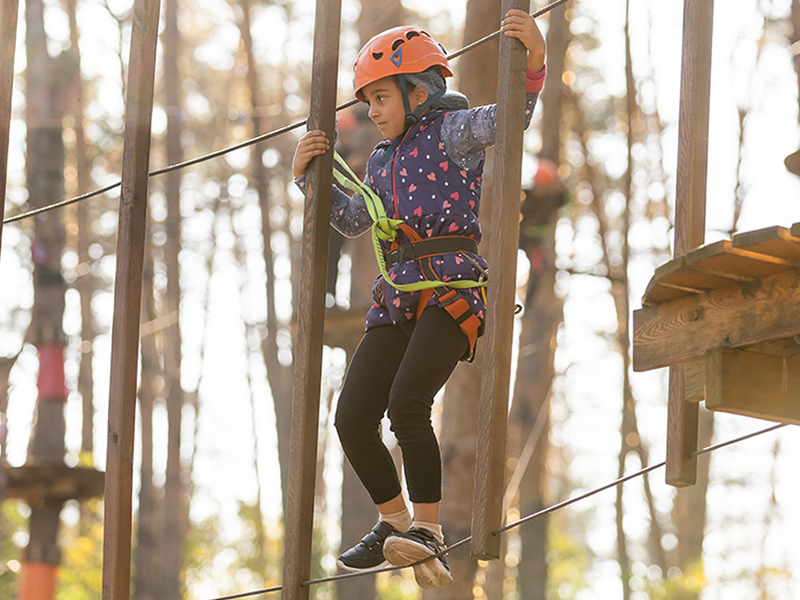“Courage is about something magical that happens on the inside that helps us push through fear, self-doubt, and anxiety; not something magical that happens inside us to make us suddenly brave.” – Jeff Ludlum
In the 1990s, when my first child was growing up in our small town, one of her fears was making new friends. Painfully shy, she preferred staying in the classroom with her teachers during recess to avoid being alone on the playground. It was a challenge for me, an extrovert, to learn effective ways to help her become confident enough to try new things and engage with other children.
When she was in elementary school, we would read our books at the community playground, while her two siblings played happily with neighborhood children. One day, looking wistfully at them playing, she sighed, “I wish I could make friends like they do.” Attempting to encourage her in a way she would understand, I closed my book, leaned in and said, “Remember, we learned if you want to have friends, you must show yourself to be friendly? If you like, I will hold your book for you, and you can go play with them.” She wasn’t ready that day – nor that year. But a seed was sown that later helped her push through her fear.
The world is different now
It is a quite different world today from the 1990s. Children today are experiencing a world that is increasingly comparative, competitive and cruel. Growing up in this environment can make many of them – as well as adults – feel like those who seem “successful” are just happier, more qualified, more attractive and part of the fabulous, fortunate few. The reality is that none of us are born with a success or happiness gene. Many ingredients go into our growth and development process that we blend daily to produce success.
One of the most powerful ingredients of success is courage. The backstory of nearly every success has unfortunate turns of events, rejections and spectacular failures. There is also courage – tremendous courage – to keep going, find another way. Not to mention the courage to try in the first place.
Define courage
One of the most important lessons kids need to learn about courage is that courage does not always feel like courage. In the age of superheroes with amazing superpowers, courage often looks powerful and cool on the outside. But on the inside, courage can feel fearful and anxious. Explain to your children that being courageous can sometimes look different on the outside from the way you think it should feel on the inside. The truth is, fear and courage roll together. When we stop and think about it, if there is no fear, why would we need courage?
Courage could look like trying something new, being kind to the new kid at school or even speaking out for something we believe in. Another important thing kids must know about courage is that we do not always see the results of our bravery. The effects of some acts of courage may take time to unfold; they do not always come with immediate recognition or applause. Kids can learn and appreciate that when actions are fueled by courage, the differences they make will be quietly forming, changing their areas of influence in the world.
Here are a few courage-building methods parents can use:
-
Acting or speaking “as if”.
Children will step up or down to parents’ expectations. Nurture the courage growing inside them. Use words like, “You made a tough decision when it was easier to do something else. That was brave!” When our kids begin to practice “acting as if” they believe they can succeed, they are building courage muscles.
-
Make friends with mistakes.
Every experience teaches us, providing insights that we did not have before. Failure and rejection are often signs that we have done something brave. The brave will achieve their goal in the end because of lessons learned from failure. Give children the grace and space for mistakes. Practice makes progress.
-
You will not always feel ready.
Acknowledge the spark of bravery within your kids. And as they work on their plan, let them know it’s OK to hang onto their comfort zone if they’re not ready to fully “let go.” When the time comes, they still may not feel ready to take the leap. Encourage them to do it, anyway. In my daughter’s experience, we supported her as she worked on her plan during her final year of high school. She chose to go to college 2,000 miles away, in a state where she knew no one. That was brave, and magical! She married her college sweetheart, went on to teach overseas for many years, traveled internationally and has friends from around the world.
-
Be the example.
As first teachers, I encourage parents to model behaviors they want their children to emulate. Everything we do is golden in their eyes; they’re watching. Share the times you feel nervous, or when you took a stand and did the opposite of what everyone else was doing. Tell about when you pushed through fear, did something big even though you felt small. Communicate to them that the courage in you is in them, too.
-
Create a courageous community.
Families are busier now than ever before, but family-friendly communities still exist. Building a network with like-minded families is beneficial for all. “It helps to have a supportive community,” notes Linda Jessup and Emory Luce Baldwin, educators with the Parent Encouragement Program (PEP) and authors of “Parenting with Courage and UNcommon Sense.” “It is especially important for us to have resources and encouragement from friends when we are immersed in the challenging and complex adventure of protecting and training the next generation.” Parents who create a village understand that parenting apart and alone in today’s world is neither desirable nor sustainable. A curated, courageous community provides a safer environment in which families can experience reciprocity, accountability and genuine love.
The rich literature available to parents these days provides many ways in which we can guide our children to become better and better in their development of life skills and courage. If something isn’t working — and courage turns cold because a decision they made feels final — it’s important to help kids understand that it’s never too late to change their minds, change friends, create a backup plan, find another way out. Think about starting a ritual of celebrating something brave each family member did during the week, maybe at mealtime. Sharing stories will provide a warm space for encouragement and great moments of insights, fun and fond memories for everyone – especially our kids – to grow on!
Related
Advice for Parenting Introverted Children
Let Kids Solve Their own Problems
7 Tips for Creating Confidence in Kids



